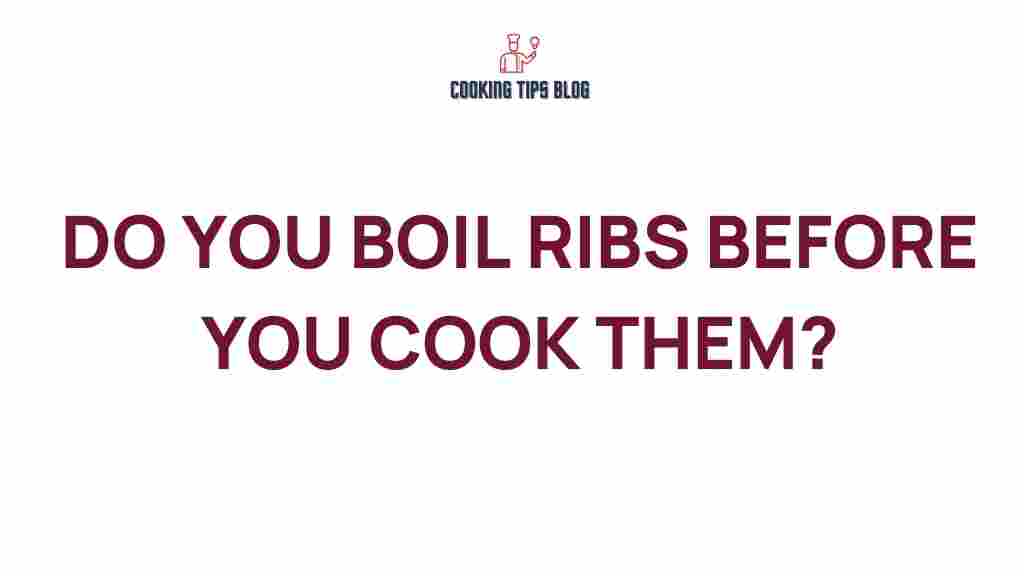Boiling Ribs: A Culinary Debate Unveiled
When it comes to cooking ribs, there are numerous methods that home cooks and chefs alike swear by. One of the most controversial techniques is boiling ribs. Some argue that boiling ribs enhances tenderness, while others believe it strips away flavor and essential juices. In this article, we will dive deep into the truth behind boiling ribs, exploring the pros and cons, the best practices, and alternative cooking methods.
The Case for Boiling Ribs
Advocates of boiling ribs often cite several advantages to the method. Here are some key points:
- Tenderness: Boiling can break down tough connective tissues, making the meat more tender.
- Quick Cooking: This method can significantly reduce cooking time, perfect for those in a hurry.
- Flavor Infusion: If done correctly, boiling ribs in a flavorful broth can enhance the overall taste.
The Case Against Boiling Ribs
On the flip side, many culinary experts recommend against boiling ribs. Here are some common arguments:
- Flavor Loss: Boiling ribs can cause a loss of natural flavors, as the meat releases juices into the water.
- Texture Issues: Some believe boiling may result in a mushy texture rather than the desired smoky or grilled finish.
- Overcooking Risk: There’s a fine line between tender and overcooked, which can be easily crossed when boiling.
How to Boil Ribs: A Step-by-Step Guide
If you’ve decided to give boiling ribs a try, follow this step-by-step guide to ensure the best results:
Ingredients Needed
- 2 racks of baby back ribs or spare ribs
- Water (enough to cover the ribs)
- 1 onion, quartered
- 3 cloves of garlic, smashed
- 1 tablespoon of salt
- 1 tablespoon of black peppercorns
- Your favorite barbecue sauce (for finishing)
Step-by-Step Instructions
- Prepare the Ribs: Remove the membrane from the back of the ribs for better flavor absorption. Rinse the ribs under cold water and pat them dry.
- Boil the Broth: In a large pot, combine water, onion, garlic, salt, and peppercorns. Bring to a boil.
- Add the Ribs: Carefully place the ribs in the boiling broth. Ensure that they are fully submerged.
- Simmer: Reduce the heat to a gentle simmer and cover the pot. Cook for 30-45 minutes, depending on the thickness of the ribs.
- Check for Tenderness: Use a fork to check if the meat is tender. It should pull away easily from the bone.
- Finish with Sauce: Preheat your grill or broiler. Remove the ribs from the pot, brush with barbecue sauce, and grill for 5-10 minutes until caramelized.
Alternative Methods to Cook Ribs
If boiling ribs doesn’t sound appealing, consider these alternative methods:
- Grilling: A popular choice that imparts a smoky flavor.
- Smoking: This low-and-slow method is favored for its intense flavor.
- Baking: Wrapping ribs in foil and baking them can yield tender results without boiling.
Troubleshooting Common Issues with Boiling Ribs
Even with the best intentions, you may encounter issues while boiling ribs. Here are some common problems and solutions:
Problem: Ribs Turn Out Tough
- Solution: Ensure you simmer the ribs long enough to break down connective tissues. If they are still tough, consider boiling longer or trying a different cooking method.
Problem: Ribs Lack Flavor
- Solution: Use a flavorful broth and consider marinating the ribs before boiling. Adding spices and aromatics can also enhance flavor.
Problem: Ribs Become Mushy
- Solution: Avoid overcooking by checking for tenderness regularly. Remove the ribs from the pot as soon as they are done.
The Best Barbecue Sauce for Boiled Ribs
To elevate the flavor of your boiled ribs, pairing them with the right barbecue sauce is crucial. Here are some popular options:
- Sweet and Smoky: A classic barbecue sauce with a balance of sweetness and smoky flavor.
- Spicy Chipotle: For those who prefer heat, a chipotle-infused sauce adds a kick.
- Vinegar-Based: A tangy sauce that complements the richness of the meat.
Conclusion: To Boil or Not to Boil Ribs?
In the culinary debate surrounding boiling ribs, there are valid points on both sides. While boiling can yield tender results and save time, it may also compromise flavor and texture. Ultimately, the choice comes down to personal preference and desired outcomes.
If you decide to experiment with boiling ribs, follow the guidelines provided, and don’t forget to finish them with your favorite barbecue sauce for that extra kick. However, don’t shy away from exploring other cooking methods to find the one that suits your taste best.
Whether you boil, grill, or smoke your ribs, the most important factor is enjoyment. So gather your friends and family, fire up the grill, and indulge in delicious ribs cooked to perfection!
For more information on cooking techniques, check out this helpful guide.
To explore the science behind cooking meats, visit this informative article.
This article is in the category Recipes and created by Cookingtipsblog Team
